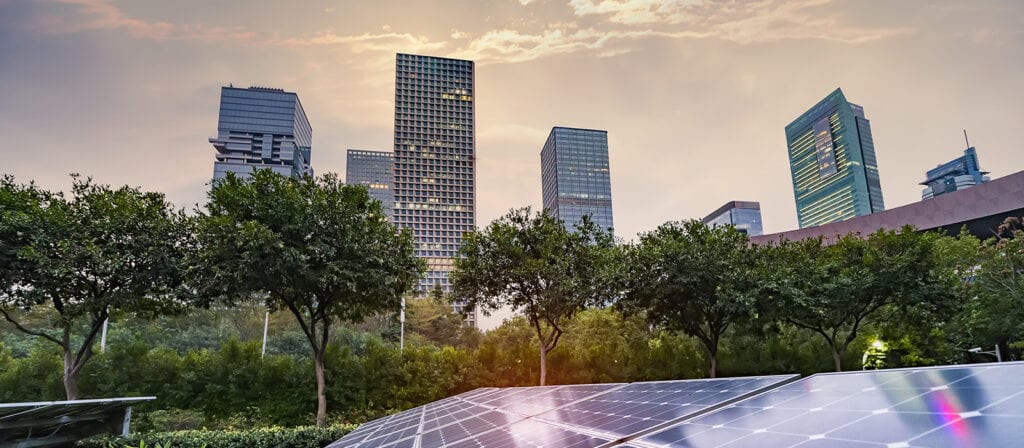Organisations will be at different stages of their journey towards net zero, but AVIVA Investors believe it is a crucial time for organisations to engage with ESG (Environmental, Social, Governance). ESG is not traditionally measured financially but now there is acceptance that these are financially material issues are an essential part of a prudent business strategy alongside traditional financial factors, such as planning/underwriting or investing. This is because of the impact they can have on people and the planet, so it is imperative to ensure not just a financially-stable future, but a sustainable one too.
AVIVA Investors believe it is important to start thinking about making the right choices now to ensure a future we want that avoids systemic risk due to interconnected factors, including population growth; demographic shifts due to climate change (estimates that two-thirds of people will no longer able to live where they do today); questions around sustainable economic growth; and the pressure on natural resources and urbanisation.
However, the main challenge that must be tackled is the impact of climate change and the direct correlation of rising emissions leading to rising temperatures. Rising emissions (at their highest in 2020) are continuing to rise, even though scientific data is indicating that warming must not exceed 1.5 degrees. Unless organisations act, the impact will likely see hurricanes, sea level rises, droughts, wildfires and extreme rainfall; all of which will have dramatic consequences physically, socially and economically.
According to the United Nations, at current rates the carbon budget for 1.5 degrees will be used up within seven years, so meeting the net zero target by 2050 is extremely important. It is essential that emissions are reduced to allow economies to decarbonise through capital allocation to low carbon technology and solutions, and that businesses transition to models aligned with a low carbon net zero economy. This is a journey that all businesses need to take., but financial services will continue to be the bedrock of economies. Having a plan is essential.
Aviva’s journey
Aviva’s strategy is a whole of business response with the ambition of being net-zero by 2040: cutting emissions from its investments by 25% in 2025 and 60% by 2030. They have been working on this for a long period and have embedded the Task Force for Climate related Disclosure (TCFD) framework. Aviva called for, served on and helped shape the frameworks’ recommendations. The framework reporting for senior management provides key information related to risks, governance and response around climate exposure, and influences long-term strategy from the top-down.
As part of the journey, Aviva is also part of a number of alliances and is one of the key leaders working on market reform. Using 1.7% of the planet’s resources every year, financial markets are not aligned with sustainability, due in part to market failures to adequately price the impact of people and the planet for the activities taken. Aviva believe the only solution is through government action and they are committed to engaging policymakers in the interests of spirit and cooperation. Furthermore, they are ensuring that they are active stewards for any investments they make: whether through their sovereign bond portfolio recommending certain steps in terms of engaging with climate action; through voting power on corporate holdings; or engaging with peers to share best-practice.
Aviva’s virtuous circle model means they can look at ESG issues knowing they can be financially material. They are then fully integrated in their investment process and analysis which helps inform investment decisions. Once they buy something they become active stewards and use their influence to push sustainable outcomes from the assets they own, also recognising a need to shape the market itself through macro-stewardship. Thinking not just how they consider the ESG factors, but the impact on people and the planet to build a more sustainable world, rather than just solely around the investment decisions
Sustainable Development Goals (SDGs)
Aviva Investors are committed to the UN SDGs and are innovating to develop investable outcomes specifically around credit, corporate bonds and investment grade credit. They have taken what they believe are the eight most investable SDGs and divided them into pillars: People, Earth and Climate (ie the most critical elements which climate change will likely affect).
They believe that all companies will be affected by climate change, not just solution providers. Taking a holistic approach allows them to have not just a portfolio impact but to deliver profit through a philosophy of avoiding harmful companies (such as those who have significant revenues from fossil-fuel generation); investing in solutions providers meeting climate adaption or mitigation needs; and by backing those companies doing a good job transitioning by managing their climate impact, and using engagement to drive change.
Climate impact measurements such as analysing green revenues or carbon intensity, is difficult. Therefore science-based targets have been adopted whereby 90% of the companies they own have signed up, or have set science-based targets by 2030. When companies commit to a science-based target they are committing to a global entity and must provide evidence which is ratified and mapped out to be aligned to the 1.5 degrees commitment. Aviva Investors believe this is the best way of measuring the impact a portfolio will have.





